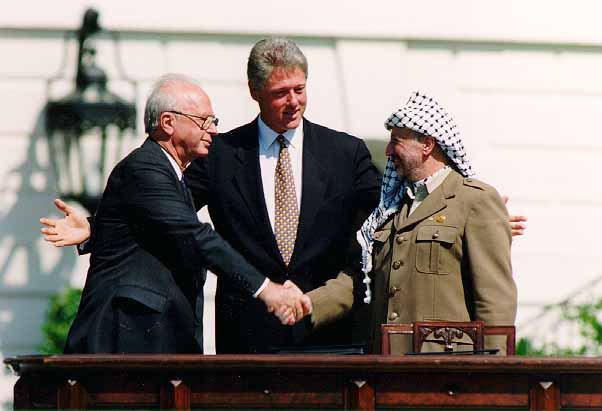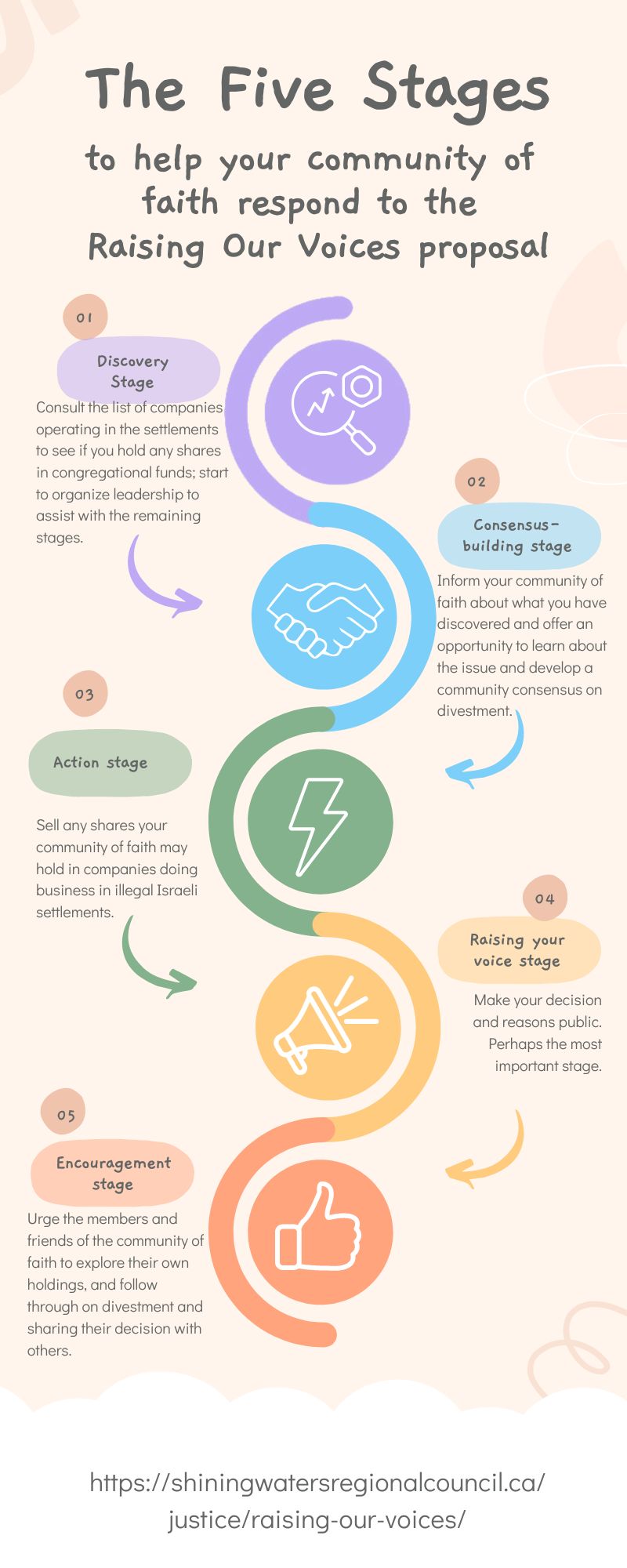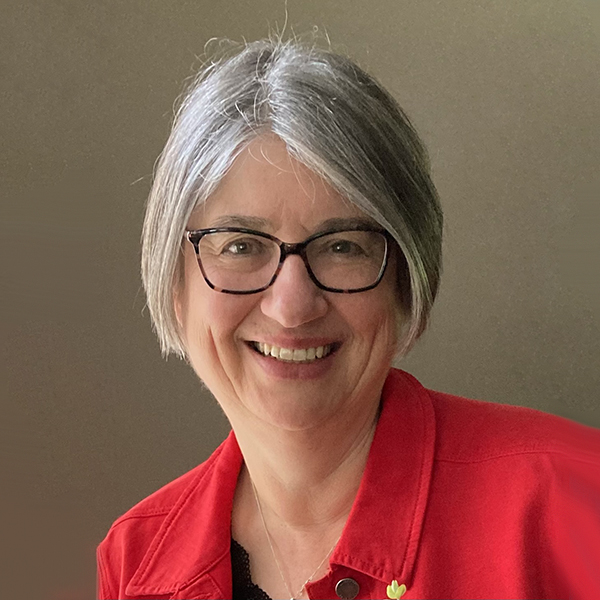Raising Our Voices
For Human Rights in Palestine and Israel
Quick links to sections on this page:
Why Divest | How to Respond | The 5 Stages | Resources | Contact Us
An Online Resource for Communities of Faith
Developed by the Palestine Network – Shining Waters (PalNet)

Israel is thriving. It provides safety for Jews from all over the world. Meanwhile, Israel’s treatment of its neighbours over the last three generations makes for less and less safety and security for Palestinians. Israeli settlements continue to expand into Palestinian territory in a clear violation of international law about military occupation of captured land. Hundreds of thousands of Jewish settlers now live there, and the settlements are also home to many businesses and industries profiting from the Occupation. This needs to end, and the world needs to raise its voice about the situation. There is a way to peacefully protest this long-standing and ever-growing violation of human rights: sell any shares we or our church have in such businesses, and let the world know that we will not profit from the illegal occupation of Palestinian territory. Divestment actions will help persuade Israel that it does not have impunity when it comes to the colonization of Palestine.
“We will not profit from the Occupation.”
In response to the 2021 Cry for Hope of Palestinian Christians, Shining Waters Region adopted a proposal at its November 2021 meeting reaffirming United Church policy on disengaging financially from companies doing business in the illegal settlements. “Raising our Voices for Human Rights” urges congregations with trust funds to inform themselves on the issue and divest any shares they may have in such firms. A growing number of North American and European denominations have taken this approach toward human rights violations against Palestinians, including our sister denomination in the U.S., The United Church of Christ. Others on the list: Episcopalians, Presbyterians, Quakers, as well as many other organizations with pension plans.
This resource from Shining Waters Region is to help your community of faith raise its own voice.
Why Divest?
This is the introduction to the proposal Shining Waters Region adopted in November, 2021. There is a list of resources below, including the whole proposal.
What is the issue?
At the creation of the state of Israel in 1948, half the Arab people of Palestine were driven from their homes, and their land. They have never been allowed to return, and life has become progressively worse ever since for those who remained. In recent decades, Israeli settlers have begun to move into the occupied Palestinian territories, setting up homes, businesses and communities (“settlements”) that are illegal under international law, further restricting the human rights of Palestinians. The separation wall erected by Israel prevents free movement of Palestinians for work, medical treatment, emergencies, family connections and farming. B’Tselem, a widely respected non-governmental human rights organization in Israel declared in 2020 that due to its policies regarding Palestine and Palestinians, Israel has become an apartheid state. Human Rights Watch and Amnesty International made the same declaration in 2021.
(The term apartheid was first used to describe South Africa’s racist segregation against non-white citizens. Apartheid – Afrikaans for “apartness” – is a crime against humanity under international law. Under the 1998 Rome statute that established the International Criminal Court, it was defined an “institutionalised regime of systematic oppression and domination by one racial group over any other” with the intent of maintaining that regime.)

The Oslo Accords of 1993 and 1995 created hope that a lasting, equitable solution might be found to assure the continued existence and security of Israel and Palestine. That has not happened. Since then the Palestinian people have been intensely frustrated not only by lack of progress toward peace but by the deepening and broadening of oppression by the Israeli armed forces and the rapid expansion of illegal settlements. In 2020, the government of Israel proposed to annex the Jordan valley and other areas, signaling its abandonment of the Oslo process. The daily struggle for Palestinians includes the military detention of children and youth and extra-judicial killings of civilians, demolition of thousands of homes and destruction of olive groves, a series of political and judicial decisions, and severe restrictions on their access to water, electricity and medical services. All Palestinians are affected, and all aspects of their society. While people of Jewish heritage are afforded the right to return to Israel, whether or not their forebears ever resided there, Palestinians forced out in 1948, 1967 or subsequently do not have that right of return, even those with deeds to property and key to homes.
Isn’t it wrong to criticize Israel?
The United Church has long opposed and continues to oppose the evil of anti-semitism, that is, hateful thoughts and actions directed toward others simply because they are Jewish. Criticizing policies and actions of the government of Israel is not anti-semitism, however. In response to requests from Christian churches and organizations in Palestine, the United Church of Canada has spoken out about the plight of Palestinians frequently over the decades. (See resource list.) One of the actions it has recommended is that faith communities and United Church entities holding investment funds take economic and other measures to draw attention to the occupation of Palestinian lands, and in particular, to the illegal settlements, which are expanding daily.
Why is this issue important?
The United Church has a long, relationship with Jewish faith groups in Canada, as described in Bearing Faithful Witness: United Church-Jewish Relations (1997) and in United Church policy. However, in the face of systematic abuses by Israel against Palestinians, whose homeland Israel is occupying, the Church must speak humbly and also with persistence. The covenant between humankind and the Holy One does not accord rights to some people that others lack. The shining message of the Torah, the prophets and the entire biblical witness is that those with power look after those without it. It affirms human rights and dignity for all. We seek justice. We resist evil.
Adoption of a strong human rights stance in relation to Palestinians and choosing to divest from businesses profiting from the illegal Israeli settlements sends a message to Israel that its behaviour is unacceptable to us, and that we will not profit from the Occupation. Muting ourselves on this issue sends a very different message, one that puts the moral authority of the Church in jeopardy by tolerating the persistent oppression of Palestinian sisters and brothers.
How to Respond
By adopting the Raising our Voices proposal, Shining Waters Region committed itself to
“speak out on human rights for Palestinians in an effort to support the ending of the illegal occupation of Palestinian lands, and specifically, to provide practical resources and support to communities of faith in the Region so that they may divest from funds invested in companies profiting from the Israeli occupation of Palestine.”
Here are the five stages that can help your community of faith to respond to the proposal. Click on them to get more detail. These stages are designed to get the whole community of faith on board so that everyone can become a storyteller about this important issue.
Discovery stage
Consult one or more of these lists of companies operating in the settlements to see if you hold any shares in congregational funds and start to organize leadership to assist with the remaining stages.
Consensus-building stage
Inform your community of faith about what you have discovered and offer an opportunity to learn about the issue and develop a community consensus on divestment.
Action stage
Sell any shares your community of faith may hold in companies doing business in illegal Israeli settlements.
Raising your voice stage
Make your decision and reasons public. Perhaps the most important stage.
Encouragement stage
Urge the members and friends of the community of faith to explore their own holdings, and follow through on divestment and sharing their decision with others.

Download and print the poster for your community of faith: The Five Stages Poster (PDF – sized for 11 x 17 paper)
How will this help?
The key is in the title of the proposal: Raising our Voice for Human Rights. Selling shares means that a community of faith or an individual is no longer profiting from the occupation. The real impact comes when we tell others what we have done and why: the companies concerned, the government of Israel, the government of Canada, other churches and our own members, friends and neighbours, the media and social media.
A culture of silence allows human rights violations against Palestinians to continue and worsen year by year. Those responsible continue to grow the colonial project of settlements in the West Bank. They believe the world doesn’t care. Or if it cares, that it will remain silent. This makes the situation disastrous for everyone involved, including settlers, companies and Israel itself. Canada now knows how bitter is the fruit of colonialism, and the ignoring of the human rights of its victims, in our case, Indigenous People. Canadians are better placed than many to say to Israel, “Stop before it gets even worse. This pattern of behaviour is a contradiction of the goals of safety and security for vulnerable people on which Israel is founded.”
“We will not profit from the Occupation”
Discovery Stage
(within the Board of Trustees/Council/Board/other group managing funds)
Are there any shares held by your community of faith in companies doing business in illegal Israeli settlements? Consult one or more of these lists of companies operating in the settlements to see if you hold any such shares in congregational funds.
United Nations Human Rights Council : 43rd session – Reports | OHCHR (https://www.ohchr.org/en/hr-bodies/hrc/regular-sessions/session43/list-reports) – (scroll to A/HRC/43/71)
Who Profits (https://www.whoprofits.org/) – an independent research center dedicated to exposing the role of the private sector in the Israeli occupation economy
Investigate (https://investigate.afsc.org) – online database that includes original research and lists over 200 company profiles. Learn how they profit from and support state violence.
You may discover that your portfolio contains none of them. In this case, consider moving to the Discussion stage to create a community consensus on the issue, so that your investment policy might reflect your community’s faith position. (The community may decide it wishes to create or modify its policy on investing trust funds to include an ethical lens.)
Share Leadership
While those in charge of investments for your community of faith can simple decide to divest from shares for ethical reasons, this action will have a much greater impact if there is a wider discussion about why to do so, and then letting others know your congregation’s decision. Current Board, Council or Board of Trustees leadership may already be occupied with ongoing administration, however. If overstretched leadership is a block to getting started, consider changing the whole concept of leadership from one leader or existing group taking it on to many people sharing it.
How could that happen and what would it look like? Consider issuing a general invitation to anyone in your community of faith interested in social justice issues. When community members gather ask them: “Why are you here? What is your key concern about human rights for Palestinians? Do you have time to do anything about it?” While those who were there may share a deep concern to act and quickly, people may already very busy or over-committed, with no one wanting to “be the leader”. What to do?
Leaders on divesting from companies doing business in the Occupied Territories may emerge almost without them recognizing it. Here are some of steps that might help your community of faith overcome this block:
Develop a focus
What to do: Invite the whole congregation to view a resource about the situation in Palestine and Israel, followed by a discussion. (See resource list.) Those who attend may well be able to offer collective leadership for the other stages. It’s often useful to divide into small groups. Listen to each group so that everyone hears the concerns and hopes of the others. By the end of the session, you are likely to reach a consensus about the divestment movement. If so, you have an action group, and the next task is to involve the rest of the community of faith in the topic.
Once those who attended the first gathering arrive at a consensus, it will likely be straightforward to identify next steps to involve others. Brainstorm options for broadening the discussion, including those listed in the consensus-building stage.
Welcome each contribution as a key part of the work and make it manageable
What to do: When someone offers to take on a task, small or large, trust that offer and understand that person as “taking a lead” on that part of the work. Encourage each person to find out more about their “task”. As task leaders get going, they will be able to share learnings with others. They might even begin rotating responsibilities among themselves as they gain confidence.
Why this works: No one takes on all the work, each doing only what they feel they can do. Collectively, your energies will expand as you learn from each other, enabling you to move forward more easily.
Limit “meetings” and get on with the work
What to do: The whole group might need to meet every 4-6 weeks. Between meetings members can work individually or in small groups on particular projects–2-3 people working on an article or an event, someone working on communications, another on understanding divestment and financial options, another preparing for meetings, different people chairing and taking notes at each meeting, and so on.
Why this works: This approach will contribute to the sense that the “leadership” of your group is fluid, and foster trust in each other to be leaders on a part of the work and to teach what each had learned. That empowers everyone!
Build expertise, if necessary
Once you have buy-in with leaders willing to help move the process along, stop to assess your skills and knowledge as a group. Members of your Board of Trustees (or Board/Council or other managers of investment funds in the community of faith) and others willing to give leadership may already be familiar with the situation in Israel and Palestine, or divestment to support change, or both. If not, you may wish to draw on leadership and resources offered by those outside the congregation.
Ways to identify and integrate external experience with the divestment process.
(Choose only those that seem wise/necessary to you.)
Develop strategic alliances
What to do: Who else is working on this? How might we benefit from their resources and save us time and energy? Members of PalNet – SW (or similar group in your region) may be able to assist. Contact PalNet by going to (contact info). Many other organizations are doing work on this. (See resource list) Identify one or two people from your group to contact them. The resources you discover will lighten your work.
Why this works: In addition to benefitting from information about divestment and advice on process, you will find you are not alone. Partner organizations can become a support network and source of ongoing motivation. You may end up sharing resources with other congregations who wish to take this on, and learn together as you undertake the work.
Key action: Invite a guest from PalNet or other external organization, as noted above, to one of your meetings, in person or virtually.
Bring in expertise.
You will discover that people from outside your community of faith are willing to help at no cost, and you can make use of their expertise.
Seek opportunities for further learning
If you identify a gap in your individual or collective knowledge, consider looking for sources of wisdom:
- Within the congregation, on issues such as the moral and economic imperatives of divestment, or internal governance processes, for instance, including how the United Church “works” and what that means for divestment.
- From external networks and organizations, by attending educational events, participating in meetings and seminars on divestment or other aspects of the struggle for human rights in Palestine, and by sharing your learning and actions with others.
- Formal education and training opportunities. For example, training on how to make presentations to a large group.
Why this works: In addition to filling gaps in your knowledge necessary to meet your goals, each member benefits from building individual knowledge and skills in a range of areas. This can lead to a collective sense of empowerment – an unexpected reward of participating in this work.
Key action: Set up an email list to share interesting resources and events with your group.
Consensus-building stage
Once the action group has explored the issue of human rights for Palestinians, let your community of faith know what you have discovered and offer others an opportunity to learn about it and develop a community consensus on divestment.
Seek to grow a shared commitment to human rights for Palestinians by:
- Introducing the proposal on divestment adopted by Shining Waters Region (November, 2021)
- including your congregation in the work,
- integrating themes of justice and peace for Palestine into worship services,
- responding to people’s questions.
The energy from this connection will flow both ways – supporting the work of the action group, and giving the congregation as a whole a shared project and shared success.
Here are strategies to foster this ongoing and reciprocal engagement.
Start the conversation with a broad discussion of human rights issues
What to do: If you start the conversation more broadly it’s possible other priorities for action by the congregation will emerge alongside human rights for Palestinians. The global discussion about human rights intensified after World War II. It was John Humphrey of Canada, Director of the UN’s Human Rights Division, who wrote the draft Universal Declaration of Human Rights. (See resource list for the Declaration, and a process to learn about human rights more broadly.)
This is the stage to address the question that hovers over all criticism of Israel or illegal settlements: is this activity antisemitic? This is a powerful concern on the part of most Christians and Christian churches, as it should be. Jewish, Christian and other groups who critique Israeli policies do so with care, but they are clear that raising our voices for human rights for Palestinians is not only valid but urgent. Use one or more of the resources below to address people’s concerns.
The parallels with other examples of colonialism, including Canada’s, are close and profound. If your community of faith is already engaged with right relations and reconciliation with Indigenous people, it will be simpler to draw comparisons with settler colonialism in Israel and Palestine.
Why this works: If the initiative of your community of faith proceeds from a shared commitment on the part of your congregation, it gives those charged with overseeing congregational funds both motivation and mandate.
Key action: Host a discussion or study session about human rights in general, and those of Palestinians in particular.
Broaden the understanding of human rights issues
What to do: Once you have had an initial conversation, invite all members of your community to learn more about the issue. Activities to engage your community:
- screen videos or movies by or about Palestinians (see resource list)
- ring your church bell to “sound the alarm” about human rights violations connected with a date of special significance to Palestinians such as Nakba Day (see resource list for significant days)
- hold a potluck dinner with neighbours who have lived experience from Palestine
- schedule post-service “Global Gossip” discussion sessions on actions taken on human rights (such as letters to the editor, conversations) or resources discovered
- develop a Lenten workshop series, perhaps using worship resources from Palestinian Christians or partner organizations there.
At every event and through the regular church bulletin, extend an open invitation to all interested members of the congregation to join your human rights group meetings and future activities.
Share regular updates on your work and human rights news more generally through your usual communications (newsletter, announcements, website and so on).
Why this works: Sustaining a broad congregational discussion about human rights for Palestinians keeps energy and support throughout the congregation high. Regular events may help recruit new participants to your action group.
Building an understanding of human rights and possible responses will inspire members of your congregation to take individual action, whether through their own personal divestment and reinvestment or by raising their voices with others.
Key action: Invite members of your congregation to participate in human rights events and actions.
Integrate the topic of just peace in Palestine/Israel into worship services
What to do: Work with your worship planners. The action group may be able to provide resources and/or leadership to highlight the effects of settlement on indigenous people in general and Palestinians in particular. If your community uses the lectionary, you may be able to coordinate biblical references to Canaan/Palestine with current events. See the resource list for significant dates in recent Palestinian history and worship material from Palestinian Christians. (Fourteen Palestinian extended families trace their faith roots all the way back to the time of Jesus.)
Why this works: Integrating human rights issues into worship highlights our common faith commitment to these concerns, and emphasizes the link between human rights and other faith-based justice work.
Key action: Work with your minister and other worship planners toward a worship service centred around human rights for Palestinians.
Build resources for congregational learning about divestment
What to do: Your action group may decide to adopt a motion on divestment for presentation to the congregational Annual Meeting. This is another opportunity to share resources for the congregation on the faith and justice rationales of divestment for discussion before the annual meeting. An outsider (such as someone from PalNet) familiar with the divestment movement may be helpful in this stage.
Some people will appreciate a larger collection of resources, with links and resources, outlining the critical faith and justice rationale for divestment, details about the divestment process and an overview of common questions and concerns.
A brief (single page) version including the wording of the proposed divestment motion for your congregational AGM will appeal to others.
In the weeks before the Annual Meeting, during a worship service, invite congregational members to read these documents and then join in a Q&A session after worship one Sunday.
The next focus could be to build a Just Peace in Palestine/Israel section of your website and compile lists of relevant organizations and resources. (The resource list below will help you get started.)
Why this works: These educational resources and information sessions allow everyone to discuss divestment, to seek further information on questions on their own, and to address any concerns that emerge before bringing the motions to a vote.
Key action: Host a Q&A session on divestment before making a formal motion.
Action stage
This is when it happens. Once you have gained the support of the community of faith, have your broker or agent sell any shares your community of faith may hold in companies doing business in illegal Israeli settlements (or if there no such holdings in your portfolio, notify them of the lists of such companies and ask them to avoid purchasing any of their shares in future). After all the consensus building, this is the easy part!
Telling your story stage
Make your decision and reasons public. This is the most important stage. The goal of Palestinian Christians is to grow a worldwide consensus that no one will profit from the illegal settlements. Divesting is non-violent resistance to the Occupation. Hearing that your community of faith (and individual members) raise their voices for human rights will empower and encourage others, as described in the fifth and final stage.
What to do: Raise your voice about human rights for Palestinians. Prepare two or more explanations of your action on divestment including why you acted, one very brief, the other(s) with more detail. One could be short enough to post on social media. Another, with more context, might go to other recipients.
Have two or three people prepare to speak for your community of faith, if asked. It could be that your community of faith can access assistance on communications/publicity from someone with expertise. Spokespeople can rehearse answers to predictable questions so they can give clear answers and make your action a positive one if print or broadcast media ask for your story.
Remember: your community of faith is doing what has been requested of it by Shining Waters Region. We are all taking action together (although on different timelines).
Ways to tell your story:
- Tell Palestine Network – Shining Waters Region (PalNet), so it can track the movement to divest across the Region and issue its own progress reports
- Post your decision and action to your website
- Social media (see sample posts, below)
- Media release for area print and electronic media [create sample release]
- Communicate to
- neighbouring communities of faith,
- the United Church of Canada justice@united-church.ca
- Letters to federal politicians such as:
- The Prime Minister justin.trudeau@parl.gc.ca
Justin Trudeau
House of Commons
Ottawa, ON
K1A 0A6 (no postage required)- The Minister of Global Affairs melanie.joly@parl.gc.ca
- Mélanie Joly
House of Commons
Ottawa, ON
K1A 0A6 (no postage required) -
MP representing your community of faith: To find your federal Member of Parliament (MP) go to http://ourcommons.ca/Members/en/search where you can view a list by name or do a search by your postal code.
- The Prime Minister justin.trudeau@parl.gc.ca
Why this matters: The wider international community (organizations, denominations, universities, financial institutions, pension funds, unions and so on) needs to pressure Israel to adopt different policies to the Occupied Palestinian Territories, including respect for the human rights of Palestinians. Raising our voices as communities of faith (and as individual investors) sends a strong message to all those who share this concern.
The right of Israel to exist is real, and important. It does not have the right, however, to slowly absorb the lands of its neighbour, the Palestinians, through continued settlement there. Israel needs to hear more and more voices raised for the human rights of Palestinians for there to be meaningful negotiation among the parties.
Our solidarity is something our Palestinian Christian partners have requested. While raising our voices might be uncomfortable for us, their lack of human rights is very costly for them every day. Silence on our part allows an intolerable situation for them to go on.
Encouragement stage
Urge the members and friends of the community of faith (and nearby communities of faith) to explore their own holdings and follow through both on divestment and sharing their decision with others. Ask anyone with a financial advisor to raise the issue and share the lists of companies with them, too. This will allow them to better advise customers seeking ethical investments.
What to do: Find a “champion” or two with investments willing to divest and speak about it within the congregation. Give that person (or people) the chance to tell their own story within the community at some point. Even if it turns out that no part of their portfolio is invested in companies doing business in the Occupied Territories, their willingness to explore their holdings and raise their voice encourages others to do likewise. Momentum grows.
Why this works: Individual example and personal contact are very strong motivators, as we all know. We often hear word of mouth ahead of all other kinds of communication. Wisdom and courage are contagious.
The five stages of divestment are all important for community ownership of this process. Feel free to adapt the guidelines for each stage to your own context.
Reactions to divesting
Once your community of faith or individual members begin to tell what you have done and why, reactions will vary. Many people will be unaware of the situation faced by Palestinians, and the consequences of the illegal settlements there. They may be grateful to be directed toward resources to help them learn more. There will be opportunities to explain what’s happening on the ground. Some may need to be reassured that divesting from companies profiting from the occupation is not antisemitic in any way.
There are some individuals and organizations, however, working to promote and extend the colonial project of the Israeli government. Some of them are Christians who believe that salvation history can only be achieved if Israel once again occupies the entire ancient borders described in the bible from three thousand years ago. Some are convinced that the whole of King David’s Israel somehow belongs to modern Israel by divine right. They are very concerned that the world is gradually understanding and opposing the injustice of the Occupation. They sometimes seek to end the discussion of human rights there and the move to divest by silencing critics. The resource list contains (a) guide(s) to help your community of faith and its members deal with backlash to raising your voices in ways that are respectful, peaceful and non-inflammatory. [edit for one or multiple guides]
Resources
Shining Waters and United Church statement and actions on Palestine & Israel
- The Raising Our Voices for Human Rights in Palestine and Israel proposal adopted by Shining Waters Region in November, 2021- PDF – 3 pages (https://shiningwatersregionalcouncil.ca/wp-content/uploads/2021/09/Raising-our-Voice-SW-equity-vers-submitted.pdf) – calls on Shining Waters and General Council to support human rights in Palestine with education, advocacy and divestment action.
United Church resources on antisemitism and relations with Jewish people
- Bearing Faithful Witness (https://tinyurl.com/55yc7mkb) – A 1997 report that looks at United Church of Canada relations to the Jewish faith.
- Independent Jewish Voices (https://www.ijvcanada.org/q-a-on-the-rabbinical-statement-on-the-uccs-proposed-resolutions-on-antisemitism-israel/) – A response from Independent Jewish Voices to criticism from a group of Canadian rabbis declaring that some of the United Church’s proposals put forward at GC44 were anti-semitic
Background on Palestine: history, maps, news sources for current situation
Online
- Palestine Solidarity Campaign (https://www.palestinecampaign.org/resources/history/) – A concise history of the situation in Palestine from Palestine Solidarity Campaign.
- History of the Question of Israel (https://www.un.org/unispal/history/) – United Nations site that looks at the history of the situation in Palestine until 2016.
- Disappearing Palestine (https://www.palestinecampaign.org/wp-content/uploads/Nakba-disappearing-palestine-postcard-PRINT-2016-1.pdf) – A map of Palestine showing its loss of territory from 1947 until today.
- Occupied with Nonviolence: A Palestinian Woman Speaks, by Jean Zaru. Zaru provides a clear-eyed view of the Palestinian occupation through the lens of her life as a justice-seeking pacifist woman of faith who has lived almost her entire life under occupation. Available on Amazon.ca and other bookstores
Newpapers and Magazines
- Mondoweiss (https://mondoweiss.net/) – News and opinion about Palestine, Israel, and the United States.
- Ha’aretz (https://www.haaretz.com/) Considered Israel’s newspaper of record and known for its left-wing and liberal stances on domestic and foreign issues.
- +972 Magazine (https://www.972mag.com/ ) – An independent, online, non-profit magazine run by a group of Palestinian and Israeli journalists that spotlights the people and communities working to oppose occupation and apartheid.
Video and Podcast Resources
A short, animated video for a very clear and succinct explanation of what created the situation in Palestine and Israel.
Apartheid charge against Israel
In recent years, more and more human rights organizations (Jewish, Christian and secular) have concluded that Israel’s treatment of its Arab citizens fulfills the United Nations definition of apartheid.
Podcast
- Undercurrents: Episode 5 – David and Goliath – 2020 Podcast – (https://lnns.co/hv7iYJE1leC)- a 30-minute Canadian podcast that provides a very accessible overview of the major issues involved in seeking justice for Palestine.
Firms profiting from illegal settlements
- United Nations Human Rights Council (https://www.ohchr.org/en/hr-bodies/hrc/regular-sessions/session43/list-reports)- for a list of companies conducting business in the settlements that profit from the occupation see the Report of the 43rd session of the and scroll down to A/HRC/43/71. (Feb. 2020)
- Investigate (https://investigate.afsc.org/) – American Friends Service Committee database of companies that are committing human rights abuses, including occupation (allows you to upload your portfolio or search on a specific fund).
- Who Profits (https://www.whoprofits.org/) – An independent research center that provides a searchable database of companies who are profiting from the Palestinian occupation in areas like settlement enterprise, economic exploitation, and population control.
Organizations working for peace, justice and human rights in Palestine and Israel
- Canadians for Justice and Peace in the Middle East (CJPME) (https://www.cjpme.org/) – works to enable Canadians of all backgrounds to promote justice, development and peace in the Middle East, and here at home in Canada.
- United Network for Justice and Peace in Palestine and Israel (UNJPPI) (https://unjppi.org/index.html) – works for a just peace in Palestine and Israel by calling for an end to the illegal Israeli occupation of Palestinian lands and equal rights for all who live in Palestine/Israel through education and advocacy.
- Independent Jewish Voices (IJV) (https://www.ijvcanada.org/about-ijv/) – works to amplify the voices of Canadian Jews in support of justice in Israel-Palestine and at home.
Human Rights
- Universal Declaration of Human Rights – (https://www.un.org/en/about-us/universal-declaration-of-human-rights) – a milestone document in the history of human rights. Drafted by representatives with different legal and cultural backgrounds from all regions of the world, the Declaration was proclaimed by the United Nations General Assembly in Paris on 10 December 1948.
- Illustrated booklet of the Universal Declaration of Human Rights – (https://www.un.org/en/udhrbook/#12) – suitable for all ages, illustrated by Yacine Ait Kaci.
- Put the World to Rights Free Online Human Rights Course (https://equitas.org/take-an-online-course/) – from Equitas (Montreal) A process for learning about human rights. This course will introduce you to human rights and help you identify ways to take action to protect and promote human rights in your everyday life.
Worship resources from Palestinian Christians
- Sabeel, Wave of Prayers (https://sabeel.org/category/wave-of-prayers) – An opportunity for friends of Sabeel Liberation Theology Centre (Jerusalem) around the world to pray over regional concerns on a weekly basis.
Significant dates in Palestinian history
- Al Nakba Remembrance Day – 15th of May -commemorates the Nakba or catastrophe in 1948 whe there was a destruction of Palestinian society and homeland and the permanent displacement of a majority of the Palestinian people
- World Week for Peace in Palestine and Israel – Third Week of September – (includes the UN International Day for Peace, Sept. 21)
- Independence Day – 15th of November – commemorates the declaration of the State of Palestine on Nov. 15, 1988
- International Day of Solidarity with the Palestinian People – 29th of November – organized by the UN In 1977 with a goal of educating the public on the question of Palestine and supporting a peaceful settlement of the Israeli-Palestinian conflict.
Christian Zionism
Christian Zionists believe that salvation history hinges on Israel regaining all the territory it held at its historic biblical maximum (about 1000 BCE). This means all of Palestine, and parts of other neighbouring countries. These Christians seem unaware that their prayers for Israel’s expansion will make Palestinian Christians refugees in their own land.
- ChristianZionism.org (https://www.christianzionism.org/) An anonymous site authored by American pastors, professors, leaders of church-related organizations and laity, who provide a number of very credible endorsements for the site.
Acknowledgement
Parts of this resource and the overall design are adapted from one produced by Trinity-St. Paul’s United Church, Toronto on divesting from fossil fuels. They are used with permission. PalNet– Shining Waters is very grateful to Trinity-St. Paul’s and all those there giving leadership on climate justice. If this issue is also of interest to your community of faith, go to https://www.trinitystpauls.ca/divest/. Their resource material reflects the challenges they faced and questions they asked themselves and heard from others as they moved to divest from shares in fossil fuel companies.
Thanks
Many thanks to Christian, Jewish and other organizations in Israel and Palestine working steadily over the decades for human rights. Thanks also to those in the United Church who have taken this cause seriously over the years and helped the Church live up to its calling. Thanks also to those who have given their time so generously to create this resource. And finally, thanks to all those who use it as a starting point for seeking justice by raising our voices for human rights in Palestine and Israel.
PalNet Support Contacts
Please contact Celio de Andrade Santos (see below) if you wish to reach out for PalNet support. He will be able to connect you to one of our Shining Waters PalNet Committee members who would be happy to discuss your community of faith’s journey through the five stages.
Staff Support

SHAWN REDDEN
Justice and Faith Formation Minister
Phone: 416-231-7680 | 1-800-268-3781
Extension: 6773
Email: sredden@united-church.ca
Serves in: Shining Waters and Canadian Shield Regional Councils
Location: Teleworks from her home
Role: Shawn encourages and connects communities of faith with matters of faith and justice and the regional council in youth and young adult ministry and matters of faith formation and liaises with the General Council in this regard.
Contact Shawn about: Affirming Ministry; Camping Ministries; Faith Formation; Guaranteed Income; Harm Reduction; Homelessness; Poverty; Social and Eco-justice; Worship and Music; Youth and Young Adult Ministry, United Church Women (UCW)

CELIO de ANDRADE SANTOS Jr.
Administrative Support
Phone: 416-231-7680 | 1-800-268-3781
Extension: 2020
Email: cdeandrade@united-church.ca
Serves in: Shining Waters Regional Council and Canadian Shield Regional Council
Location: Teleworks and works in the Guthrie office
Role: Celio provides administrative support to Shining Waters and Canadian Shield Regional Councils.






